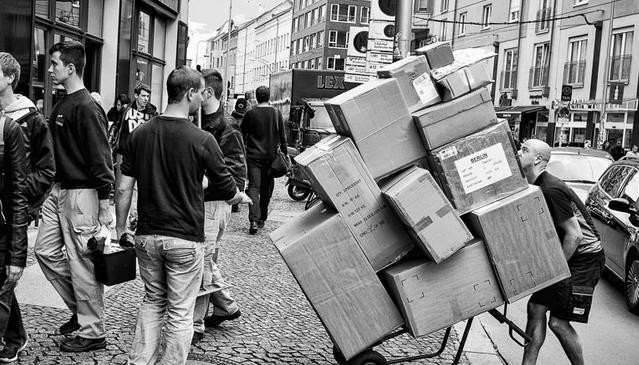The Super-Urban Promise

“Imagine the ability to create a standing order of Starbucks delivered hot to your desk daily,” commands CEO Howard Schultz. “That’s our version of e-commerce on steroids.” IMAGINE. At face value, this sounds like a reductio ad absurdum scenario for the new logistics-obsessed economy, in which a product is created and then shipped to people who could either make it on their own or purchase it in person at one of the many physical retail locations situated between their beds and their desks. But no, if you actually do imagine this, it’s absurd but appealing: If you could summon coffee to your desk every day for a nominal fee, with some sort of set-it-and-forget-it ordering system, you might consider it. After the first week you would stop thinking of it as crazy, and it would just be there, an ambient feature of the economy like bottled water or $0.99 hamburgers.
A system like this would only work in a limited set of places and in a limited set of scenarios. It is, like so many new delivery services — Seamless, Freshdirect, Caviar, SpoonRocket (sorry), Washio (seriously just one more), DoorDash — a concept for cities, where physical density means delivering a low-priced order is economically feasible.
But if you unspool this, supposing that nothing interferes with the god-given inevitability of every delivery startup and the manifest destiny of the overall on-demand economy, you end up with some pretty big adjustments to the definitions of urban and suburban lifestyles.
The new view: To live in a city with disposable income is to be able to have everything delivered, expensive or inexpensive, disposable or edible or whatever, directly to your door. To live outside of the city is to leave that grid to settle for an older, lesser grid, in which cheaper products don’t come to you but the other way around. You can still get more expensive things delivered, or cheaper things delivered for a fee, or just Amazon things, but probably not coffee or one bowl of soup or laundry. Stopping by the coffee shop, in this future optimum urban utopia, is either an economic necessity or an affectation, either downscale or premium, like thrift shopping vs. vintage shopping. Environmental identities get muddled and flipped; previously important differences between affluent urban, suburban and rural lifestyles fade into the background. Cities, no longer the difficult but rewarding lifestyle alternative, become the easy option.
Photo by Niels Linneberg
